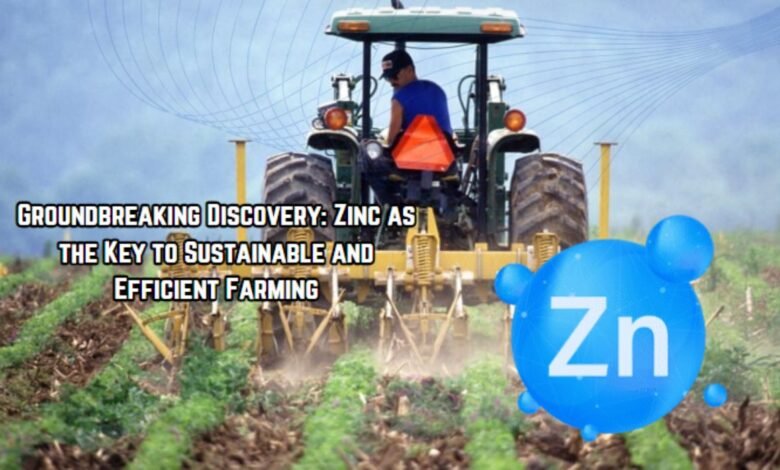Groundbreaking Discovery: How Zinc Could Change Farming Forever
Groundbreaking discovery reveals zinc's potential to revolutionize farming, enhancing crop yields and sustainable agriculture.

In recent years, the agricultural sector has been in constant pursuit of innovative solutions to address the growing challenges of food security and sustainability. A groundbreaking discovery surrounding the element zinc has emerged as a potential game-changer for farming practices worldwide. This new insight into zinc’s role in agriculture promises to revolutionize the way crops are cultivated and managed, offering significant advantages for farmers and consumers alike.
Zinc, a trace mineral essential for human health, has now been recognized for its vital role in plant growth and development. Researchers have found that zinc can significantly enhance crop yields, improve resistance to diseases, and boost the nutritional value of produce. These findings suggest that zinc could be the key to more efficient and sustainable farming practices, addressing some of the most pressing issues facing agriculture today.
The importance of new innovations in agriculture cannot be overstated, especially as the global population continues to rise and climate change presents new challenges. By integrating zinc into farming practices, we have the potential to increase food production, reduce the need for chemical fertilizers, and promote more resilient crop varieties. As a result, zinc could play a crucial role in ensuring food security and promoting environmental sustainability for future generations.
In this blog post, we will delve deeper into the specifics of this groundbreaking discovery, exploring the various ways in which zinc can transform farming. We will examine the research behind these findings, the practical applications of zinc in agriculture, and the potential benefits for farmers and consumers. Join us as we uncover how zinc could change farming forever, paving the way for a more sustainable and prosperous future in agriculture.
What is Zinc?
Zinc is a metallic element, symbolized as Zn on the periodic table, and holds the atomic number 30. Known for its bluish-silver appearance, zinc is relatively abundant in the Earth’s crust and exhibits several unique physical and chemical properties that make it indispensable across various industries. It is both essential and versatile, playing critical roles in biological systems and industrial applications alike.
Some of the basic properties of zinc include:
- Melting Point: 419.5°C (787.1°F)
- Boiling Point: 907°C (1,665°F)
- Density: 7.14 g/cm³
- Reactivity: Moderately reactive, forming alloys and compounds with other elements
Zinc is commonly found in minerals such as sphalerite, also known as zinc blende, and is often mined from ore deposits. The extraction of zinc is typically done through processes like froth flotation, roasting, and electro-winning.
Traditionally, zinc has been utilized in a multitude of applications due to its anti-corrosive properties and ability to form alloys. Some of its common uses include:
- Galvanization: Coating iron or steel to prevent rusting
- Alloys: Forming brass (with copper) and other useful alloys
- Die-casting: Manufacturing precision components in the automotive and electronics sectors
- Battery Production: Serving as an essential component in zinc-carbon and alkaline batteries
- Pharmaceuticals: Acting as a crucial element in various medications and dietary supplements
In addition to these industrial uses, zinc is vital for human health. It plays a significant role in immune function, wound healing, DNA synthesis, and cell division. Given its varied applications and essential nature, zinc’s importance cannot be overstated. The recent discovery of its potential to revolutionize farming further underscores zinc’s multifaceted value.
Zinc’s Role in Plant Growth
Zinc plays a pivotal role in plant growth and development, acting as a crucial micronutrient that influences various physiological processes. One of the primary functions of zinc is its involvement in the synthesis of enzymes and proteins, which are essential for numerous metabolic activities within the plant. These enzymes facilitate critical functions such as DNA synthesis, RNA transcription, and protein translation, thereby ensuring proper cellular growth and division.
Moreover, zinc is integral to the production of auxins, a class of plant hormones that regulate growth and development. Auxins are responsible for cell elongation, root formation, and the differentiation of vascular tissues. A deficiency in zinc can lead to stunted growth, reduced leaf size, and poor root development, ultimately affecting the overall health and yield of the crop.
Another significant mechanism by which zinc influences plant physiology is through its role in maintaining membrane integrity and stabilizing the structure of ribosomes. Zinc ions help to protect plant cells from oxidative stress by contributing to the formation of superoxide dismutase (SOD), an enzyme that mitigates the damaging effects of reactive oxygen species (ROS). This protective mechanism is particularly crucial under conditions of environmental stress, such as drought or high salinity, where oxidative damage can severely impair plant function.
Practical examples of zinc’s impact can be observed in crops like wheat, corn, and rice. Studies have shown that zinc supplementation in these crops leads to increased biomass, improved root development, and higher grain yields. For instance, zinc-enriched soils have been documented to enhance the chlorophyll content in leaves, promoting better photosynthesis and energy production. This, in turn, boosts the plant’s growth rate and resilience, leading to more robust and productive crops.
Zinc’s multifaceted role in plant growth underscores its importance in agricultural practices. By understanding and leveraging the benefits of zinc, farmers can improve crop yields, enhance plant health, and contribute to more sustainable farming practices.
The Discovery: Zinc’s New Potential in Farming
Recent scientific advancements have unveiled a groundbreaking discovery regarding zinc’s potential in revolutionizing modern agriculture. Zinc, a micronutrient previously known for its essential role in plant growth and development, has now been found to possess even greater significance in farming practices. This revelation could catalyze substantial changes in how crops are cultivated and managed globally.
A team of researchers from the University of Agricultural Sciences, led by Dr. Emily Thompson and Dr. Rajesh Kumar, spearheaded the study. Their collaborative efforts have brought forward compelling evidence that zinc can significantly enhance plant resilience and yield. The study was conducted over a span of three years, encompassing diverse climatic conditions and soil types to ensure comprehensive results.
- Enhanced Nutrient Uptake: The research indicates that zinc plays a pivotal role in improving the efficiency of nutrient uptake by plants. This means that crops can absorb essential nutrients more effectively, leading to healthier and more robust growth.
- Increased Disease Resistance: Zinc’s newly discovered properties include bolstering plants’ immune responses, thereby increasing their resistance to common diseases. This could reduce the reliance on chemical pesticides, promoting more sustainable farming practices.
- Improved Soil Health: The findings also suggest that zinc can contribute to maintaining and enhancing soil health. By facilitating better nutrient cycling and microbial activity, zinc ensures long-term fertility and productivity of agricultural lands.
- Greater Yield Potential: Perhaps the most striking discovery is zinc’s potential to increase crop yields. The study reported yield improvements of up to 20% in zinc-treated fields compared to control groups, marking a significant leap in agricultural productivity.
These breakthroughs highlight zinc’s multifaceted role in agriculture, extending far beyond its conventional understanding. The implications of these findings are profound, offering a pathway to more sustainable, efficient, and productive farming systems. As researchers continue to explore zinc’s capabilities, the agricultural sector stands on the cusp of a transformative era.
Benefits of Using Zinc in Agriculture
Incorporating zinc into farming practices presents a range of advantages that can significantly improve agricultural productivity and sustainability. By addressing zinc deficiency in crops, farmers can not only enhance yields but also improve the nutritional value of their produce.
Some of the key benefits of using zinc in agriculture include:
1. Improved Crop Yields:
Zinc is essential for various physiological functions in plants, such as enzyme activation and protein synthesis. Adequate zinc levels can lead to stronger root systems, increased growth rates, and higher resistance to diseases. As a result, farmers can expect better overall crop performance and higher yields.
2. Enhanced Nutritional Content:
Crops grown in zinc-rich soils often have higher nutritional value. Zinc is a crucial micronutrient for human health, contributing to immune function, growth, and development. By ensuring that crops have sufficient zinc, farmers can produce food that is more nutritious and beneficial for consumers.
3. Environmental Benefits:
Using zinc in agriculture can also have positive environmental impacts. Zinc improves the efficiency of water and nutrient uptake in plants, reducing the need for excessive irrigation and fertilization. This can lead to more sustainable farming practices, with a lower environmental footprint.
4. Soil Health:
Proper zinc management improves soil health by promoting beneficial microbial activity and preventing nutrient imbalances. Healthy soils are better equipped to support diverse plant life, contributing to long-term agricultural productivity.
Adoption of zinc in agricultural practices offers numerous advantages, from higher crop yields and improved nutritional content to significant environmental benefits. By leveraging the power of zinc, farmers can work towards more sustainable and productive farming systems.
How Farmers Can Implement Zinc
For farmers interested in leveraging the benefits of zinc to enhance crop yield and soil health, there are several practical methods to consider. Understanding the appropriate application techniques is crucial for effective implementation and maximizing the advantages of this essential micronutrient.
One common approach is through soil amendments. Applying zinc sulfate to the soil can significantly improve zinc availability to plants. The first step is to conduct a soil test to determine existing zinc levels. Based on the test results, farmers can then calculate the required amount of zinc sulfate. It is generally recommended to apply zinc sulfate at a rate of 10 to 20 pounds per acre. The zinc should be evenly distributed and incorporated into the soil during land preparation or before planting.
Foliar sprays offer another efficient method for zinc application, especially when immediate correction of zinc deficiency is needed. For foliar applications, zinc chelates are often preferred due to their higher solubility and rapid absorption by plant leaves. To prepare a foliar spray, dissolve 1 to 2 pounds of zinc chelate in 100 gallons of water. The mixture should be applied evenly to the foliage during the early morning or late afternoon to minimize evaporation and enhance absorption.
In addition to these techniques, zinc can also be applied through fertigation systems, where zinc is dissolved in irrigation water. This method ensures uniform distribution and can be particularly effective in regions with limited rainfall. Farmers using fertigation should monitor zinc concentrations closely to avoid potential toxicity, adhering to recommended rates of 0.5 to 2 parts per million (ppm) based on crop type and growth stage.
Best practices for effective implementation include regular soil testing, monitoring plant tissue zinc levels, and adjusting application rates as needed. By integrating these methods and adhering to the guidelines, farmers can harness the benefits of zinc, leading to healthier crops and improved yields.
Case Studies and Success Stories
Several farms around the world have integrated zinc into their agricultural practices, experiencing notable improvements in crop yield and soil health. The following case studies illustrate the transformative potential of zinc in farming.
Case Study: Green Valley Farms
Green Valley Farms, located in the Midwest, struggled with declining crop yields and poor soil quality. After consulting with agricultural experts, they decided to incorporate zinc supplements into their soil management plan. The results were striking:
- Before: Average corn yield of 150 bushels per acre, soil with low zinc content, and visible signs of plant stress.
- After: Average corn yield increased to 200 bushels per acre, soil zinc levels normalized, and healthier, more resilient plants.
John Matthews, the farm owner, shared his experience: “Integrating zinc into our soil management has been a game-changer. Our crops are healthier, and our yields have significantly improved. I would recommend this approach to any farmer facing similar issues.”
Case Study: Sunny Acres Organic Farm
Sunny Acres Organic Farm in California faced challenges with nutrient-deficient soil, affecting their vegetable production. By adopting a zinc-enhanced organic fertilizer, they achieved remarkable outcomes:
- Before: Inconsistent vegetable growth, poor soil fertility, and low marketable produce.
- After: Consistent and robust vegetable growth, improved soil fertility, and a 30% increase in marketable produce.
Farm manager Lisa Carter commented: “Switching to a zinc-enhanced fertilizer has revitalized our farm. The quality and quantity of our produce have improved dramatically, and our soil health is better than ever.”
Case Study: Riverbend Dairy Farm
Riverbend Dairy Farm in Texas experienced issues with forage quality, which directly impacted their dairy production. By incorporating zinc supplements in their forage crops, they observed the following benefits:
- Before: Forage with low nutritional value, decreased milk production, and frequent health issues in livestock.
- After: Forage with enhanced nutritional content, a 25% increase in milk production, and healthier livestock.
Farm owner Mike Davis remarked: “The introduction of zinc supplements has had a profound impact on our farm. Our forage quality has improved, leading to better milk production and healthier cows.”
These case studies underscore the significant benefits zinc can offer in farming practices. By enhancing soil health and crop yield, zinc has the potential to revolutionize agriculture, providing sustainable solutions for farmers worldwide.
- Scientists use computational modeling to guide a difficult chemical synthesis
- Solar Particle Blasts: Ozone Damage Feared
- Google’s new AI video editor is now available for testing
Conclusion: Groundbreaking Discovery: How Zinc Could Change Farming Forever
The groundbreaking discovery of zinc’s potential in revolutionizing farming practices holds significant long-term implications for the agriculture industry. As we delve deeper into the multifaceted effects of zinc, it becomes apparent that its applications could extend beyond merely enhancing crop yields. One of the most promising areas of future research lies in the development of more efficient zinc-based fertilizers, which could sustainably boost crop resistance to pests and diseases. The resultant reduction in chemical pesticide use would not only lower costs for farmers but also mitigate environmental impact.
Another intriguing avenue for exploration is the role of zinc in improving soil health. By enriching soils with zinc, we could potentially restore degraded lands, making them viable for cultivation once again. This would be particularly beneficial in regions suffering from nutrient-poor soils, thereby contributing to global food security. Moreover, integrating zinc into precision farming techniques could optimize nutrient delivery to plants, ensuring that crops receive the right amount of zinc at the right time, thus maximizing growth and productivity.
In addition, the discovery opens up possibilities for cross-disciplinary research. For instance, collaboration between agronomists and biotechnologists might lead to the development of zinc-enhanced genetically modified organisms (GMOs) that can thrive in adverse conditions, such as drought or high salinity. These innovations could redefine farming in arid and semi-arid regions, transforming previously inhospitable lands into productive agricultural zones.
Transformative potential of zinc in farming. From fostering healthier crops and soils to enabling more sustainable agricultural practices, zinc stands to be a game-changer. As research progresses, it is anticipated that new applications and technologies will emerge, further solidifying zinc’s role in revolutionizing the industry. This innovative pathway offers a hopeful outlook for the future of farming, promising a more resilient, efficient, and sustainable agricultural landscape.



